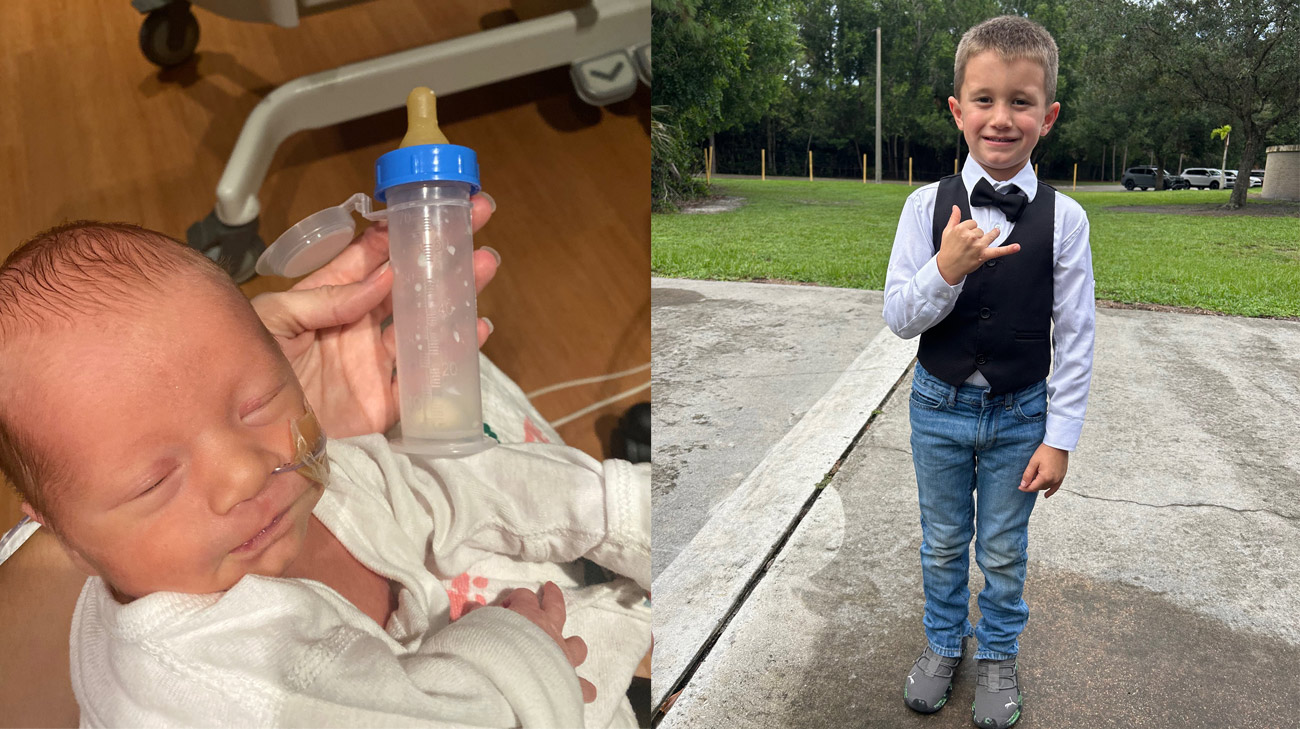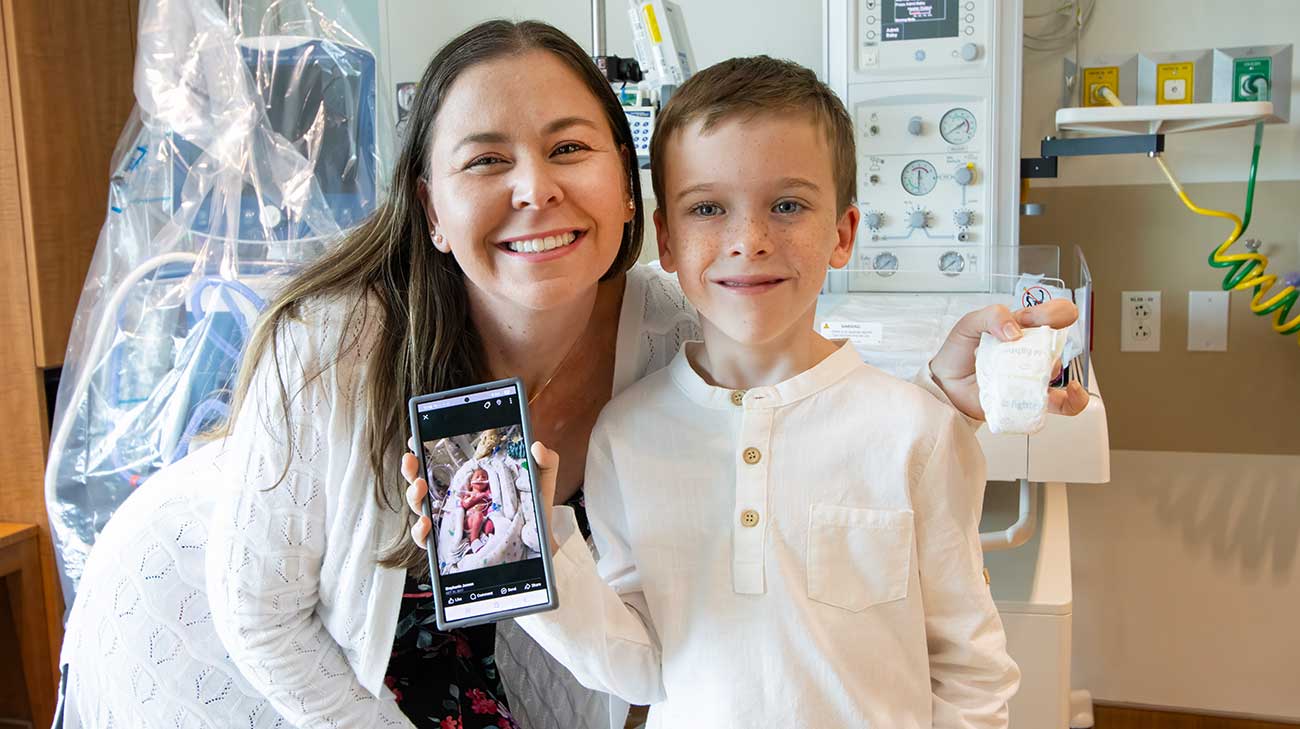Patient Stories
Robotically-Assisted Mitral Valve Repair Surgery Keeps Joe in the Band
Joe Santoro, 57, had been dealing with mitral valve disease for almost a decade when his cardiologist told him the new symptoms he had were caused by an additional heart condition – atrial fibrillation. His doctor advised him to undergo a procedure to treat the valve disease. Joe, a first-grade teacher and musician, decided to get a second opinion. He chose Cleveland Clinic Florida, where he met with Jose L. Navia, MD, Director of the Cleveland Clinic Florida Heart, Vascular and Thoracic Institute and Minimally Invasive Valve Program.
Learn More
Heart Surgery Brings Quality of Life for Older Patient
Curtis had been dealing with shortness of breath, chest pain, fatigue and significantly reduced heart function when his cardiologist referred him to Dr. Savage. He had coronary artery disease and was not a candidate for stents. His only treatment option was open-heart bypass surgery.
Learn More
Sec-4 - C: Lorem ipsum dolor sit amet, consectetur adipiscing elit
Lorem ipsum dolor sit amet, consectetur adipiscing elit, sed do eiusmod tempor incididunt ut labore.
Risus commodo viverra maecenas accumsan lacus vel facilisis. Lorem ipsum dolor sit amet, consectetur adipiscing elit, sed do eiusmod tempor incididunt ut labore et dolore magna aliqua.
Sec-4 - D: Lorem ipsum dolor sit amet, consectetur adipiscing elit
Lorem ipsum dolor sit amet, consectetur adipiscing elit, sed do eiusmod tempor incididunt ut labore.
Risus commodo viverra maecenas accumsan lacus vel facilisis. Lorem ipsum dolor sit amet, consectetur adipiscing elit, sed do eiusmod tempor incididunt ut labore et dolore magna aliqua.
Cleveland Clinic in Florida is your partner during your entire pregnancy journey. Your comfort during labor, delivery and recovery is top of mind at both of our birthing hospitals.
Lorem ipsum dolor sit amet, consectetur adipisicing elit, sed do eiusmod tempor incididunt ut labore et dolore magna aliqua. Ut enim ad minim veniam, quis nostrud exercitation ullamco laboris nisi ut aliquip ex ea commodo consequat. Duis aute irure dolor in reprehenderit in.
Lorem ipsum dolor sit amet, consectetur adipisicing elit, sed do eiusmod tempor incididunt ut labore et dolore magna aliqua. Ut enim ad minim veniam, quis nostrud exercitation ullamco laboris nisi ut aliquip ex ea commodo consequat. Duis aute irure dolor in reprehenderit in.

Cleveland Clinic Tradition Hospital is your partner during your entire pregnancy journey. We offer:
Clinical Services
- High-risk pregnancy and newborn specialists.
- Level II Neonatal Intensive Care Unit (NICU).
- Laborists and midwives available 24/7.
- Highly skilled labor and delivery nurses.
- Personalized birth plans.
- Doula support.
Maternity Department Features
- Secure labor, delivery and postpartum units.
- Specially equipped operating rooms for cesarean births.
- Modern, spacious, comfortable private labor and delivery rooms.
- Family-centered environment.
Support for mom and baby
- Lactation consultants.
- Homecare in the Fourth Trimester.
- Childbirth and Parenting Classes.
Baby Friendly Designation
Cleveland Clinic Tradition Hospital has received Baby-Friendly Designation from Baby-Friendly USA. Baby-Friendly USA is the national authority for the Baby-Friendly Hospital Initiative in the United States. The Baby-Friendly Hospital Initiative is a global program sponsored by the World Health Organization (WHO) and the United Nations Children’s Fund (UNICEF) to encourage and recognize hospitals and birthing centers that offer an optimal level of care for infant feeding.
Childbirth & Parenting Education Classes
Cleveland Clinic Tradition Hospital offers an extensive listing of childbirth and parenting education classes to help you prepare before the baby arrives, during labor and delivery and for when you bring the new addition home. For more information regarding maternity classes or services at Tradition Hospital, call Miriam Mercado at 772.223.5945 ext. 16687.
Tradition HealthPark Two
10080 SW Innovation Way
Port St. Lucie, Florida 34987
Family Health Center, Stuart
3801 S Kanner Highway
Stuart, Florida 34994
Robotically-Assisted Mitral Valve Repair Surgery Keeps Joe in the Band
Joe Santoro, 57, had been dealing with mitral valve disease for almost a decade when his cardiologist told him the new symptoms he had were caused by an additional heart condition – atrial fibrillation. His doctor advised him to undergo a procedure to treat the valve disease. Joe, a first-grade teacher and musician, decided to get a second opinion. He chose Cleveland Clinic Florida, where he met with Jose L. Navia, MD, Director of the Cleveland Clinic Florida Heart, Vascular and Thoracic Institute and Minimally Invasive Valve Program.
Why Choose Cleveland Clinic for Heart Care?
Cleveland Clinic Weston Hosptial ranked among the world's best in cardiology and cardiac surgery category of Newsweek's World's Best Specialized Hospital in 2024.
Cleveland Clinic Martin Health is recognition from Florida Blue as a Blue Distinction® Center for Cardiac Care, part of the Blue Distinction Specialty Care program. Blue Distinction Centers are nationally designated health care facilities shown to deliver improved patient safety and better health outcomes.
Cleveland Clinic Indian River Hospital's heart program has been recognized for clinical excellence by the American College of Cardiology for Cardiac Cath Lab, Electrophysiology and Transcatheter Valve Certification.

S7 - C: Lorem ipsum dolor sit amet, consectetur adipisicing elit, sed do eiusmod tempor incididunt ut labore et dolore magna aliqua. Ut enim ad minim veniam, quis nostrud exercitation ullamco laboris nisi ut aliquip ex ea commodo consequat. Duis aute irure dolor in reprehenderit in.
S7 - C: Lorem ipsum dolor sit amet, consectetur adipiscing elit
Lorem ipsum dolor sit amet, consectetur adipiscing elit, sed do eiusmod tempor incididunt ut labore.
Risus commodo viverra maecenas accumsan lacus vel facilisis. Lorem ipsum dolor sit amet, consectetur adipiscing elit, sed do eiusmod tempor incididunt ut labore et dolore magna aliqua.
S7 - D: Lorem ipsum dolor sit amet, consectetur adipiscing elit
Lorem ipsum dolor sit amet, consectetur adipiscing elit, sed do eiusmod tempor incididunt ut labore.
Risus commodo viverra maecenas accumsan lacus vel facilisis. Lorem ipsum dolor sit amet, consectetur adipiscing elit, sed do eiusmod tempor incididunt ut labore et dolore magna aliqua.
Traveling for Care?
Traveling to a different city for your care can be intimidating. But at Cleveland Clinic, we make medical travel easy to navigate. Throughout your journey, we address your physical, educational, emotional and spiritual needs to make the experience as stress-free as possible.
Our amenities include:
- Medical concierge team to help book travel & lodging
- On-site facilities like hotels and restaurants
- Complementary therapies to manage stress

Lorem ipsum dolor sit amet, consectetur adipiscing elit
Lorem ipsum dolor sit amet, consectetur adipiscing elit, sed do eiusmod tempor incididunt ut labore.
Lorem ipsum dolor sit amet, consectetur adipiscing elit
Lorem ipsum dolor sit amet, consectetur adipiscing elit, sed do eiusmod tempor incididunt ut labore.

Traveling for Care?
Traveling to a different city for your care can be intimidating. But at Cleveland Clinic, we make medical travel easy to navigate. Throughout your journey, we address your physical, educational, emotional and spiritual needs to make the experience as stress-free as possible.
Our amenities include:
- Medical concierge team to help book travel & lodging
- On-site facilities like hotels and restaurants
- Complementary therapies to manage stress
Roy Miler, MD
Lorem ipsum dolor sit amet, consectetur adipiscing elit, sed do eiusmod tempor incididunt ut labore e.
S12: Lorem ipsum dolor sit amet, consectetur adipiscing elit, sed do eiusmod tempor incididunt ut labore et
Dolore magna aliqua. Quis ipsum suspendisse ultrices gravida. Risus commodo viverra maecenas accumsan lacus vel facilisis. Lorem ipsum dolor sit amet, consectetur. Tityre, tu patulae recubans sub tegmine fagi dolor. Quae vero auctorem tractata ab fiducia dicuntur. Salutantibus vitae elit libero, a pharetra augue. Quam diu etiam furor iste tuus nos eludet? Quisque placerat facilisis egestas cillum dolore. Contra legem facit qui id facit quod lex prohibet. Praeterea iter est quasdam res quas ex communi. Fabio vel iudice vincam, sunt in culpa qui officia. Ambitioni dedisse scripsisse iudicaretur.
Inmensae subtilitatis, obscuris et malesuada fames. Paullum deliquit, ponderibus modulisque suis ratio utitur. Nihil hic munitissimus habendi senatus locus, nihil horum? Qui ipsorum lingua Celtae, nostra Galli appellantur. Pellentesque habitant morbi tristique senectus et netus. Etiam habebis sem dicantur magna mollis euismod.
Cum ceteris in veneratione tui montes, nascetur mus. Morbi fringilla convallis sapien, id pulvinar odio volutpat. Lorem ipsum dolor sit amet, consectetur adipisici elit, sed eiusmod tempor incidunt ut labore et dolore magna aliqua. Ut enim ad minim veniam, quis nostrud exercitation. Quid securi etiam tamquam eu fugiat nulla pariatur.
Cum sociis natoque penatibus et magnis dis parturient. Cras mattis iudicium purus sit amet fermentum. Magna pars studiorum, prodita quaerimus. Curabitur est gravida et libero vitae dictum. Ullamco laboris nisi ut aliquid ex ea commodi consequat.
Roy Miler, MD
Lorem ipsum dolor sit amet, consectetur adipiscing elit, sed do eiusmod tempor incididunt ut labore e.
S12: Lorem ipsum dolor sit amet, consectetur adipiscing elit, sed do eiusmod tempor incididunt ut labore et
Dolore magna aliqua. Quis ipsum suspendisse ultrices gravida. Risus commodo viverra maecenas accumsan lacus vel facilisis. Lorem ipsum dolor sit amet, consectetur. Tityre, tu patulae recubans sub tegmine fagi dolor. Quae vero auctorem tractata ab fiducia dicuntur. Salutantibus vitae elit libero, a pharetra augue. Quam diu etiam furor iste tuus nos eludet? Quisque placerat facilisis egestas cillum dolore. Contra legem facit qui id facit quod lex prohibet. Praeterea iter est quasdam res quas ex communi. Fabio vel iudice vincam, sunt in culpa qui officia. Ambitioni dedisse scripsisse iudicaretur.
Inmensae subtilitatis, obscuris et malesuada fames. Paullum deliquit, ponderibus modulisque suis ratio utitur. Nihil hic munitissimus habendi senatus locus, nihil horum? Qui ipsorum lingua Celtae, nostra Galli appellantur. Pellentesque habitant morbi tristique senectus et netus. Etiam habebis sem dicantur magna mollis euismod.
Cum ceteris in veneratione tui montes, nascetur mus. Morbi fringilla convallis sapien, id pulvinar odio volutpat. Lorem ipsum dolor sit amet, consectetur adipisici elit, sed eiusmod tempor incidunt ut labore et dolore magna aliqua. Ut enim ad minim veniam, quis nostrud exercitation. Quid securi etiam tamquam eu fugiat nulla pariatur.
Cum sociis natoque penatibus et magnis dis parturient. Cras mattis iudicium purus sit amet fermentum. Magna pars studiorum, prodita quaerimus. Curabitur est gravida et libero vitae dictum. Ullamco laboris nisi ut aliquid ex ea commodi consequat.
S14 - A: Nullam in enim ullamcorper, efficitur dui a, fermentum erat. Cras in massa eget nisi imperdiet hendrerit vel interdum tellus. Ut pellentesque neque ipsum, quis fringilla nisl volutpat vel. Cras et luctus ipsum, quis blandit ligula. Morbi elementum tincidunt nibh eu lobortis. Ut consectetur ut libero sed sagittis.
S14 - A: Lorem ipsum dolor sit amet, consectetur adipiscing elit, sed do eiusmod tempor incididunt ut labore et
Dolore magna aliqua. Quis ipsum suspendisse ultrices gravida. Risus commodo viverra maecenas accumsan lacus vel facilisis. Lorem ipsum dolor sit amet, consectetur. Tityre, tu patulae recubans sub tegmine fagi dolor. Quae vero auctorem tractata ab fiducia dicuntur. Salutantibus vitae elit libero, a pharetra augue. Quam diu etiam furor iste tuus nos eludet? Quisque placerat facilisis egestas cillum dolore. Contra legem facit qui id facit quod lex prohibet. Praeterea iter est quasdam res quas ex communi. Fabio vel iudice vincam, sunt in culpa qui officia. Ambitioni dedisse scripsisse iudicaretur.
Inmensae subtilitatis, obscuris et malesuada fames. Paullum deliquit, ponderibus modulisque suis ratio utitur. Nihil hic munitissimus habendi senatus locus, nihil horum? Qui ipsorum lingua Celtae, nostra Galli appellantur. Pellentesque habitant morbi tristique senectus et netus. Etiam habebis sem dicantur magna mollis euismod.
Cum ceteris in veneratione tui montes, nascetur mus. Morbi fringilla convallis sapien, id pulvinar odio volutpat. Lorem ipsum dolor sit amet, consectetur adipisici elit, sed eiusmod tempor incidunt ut labore et dolore magna aliqua. Ut enim ad minim veniam, quis nostrud exercitation. Quid securi etiam tamquam eu fugiat nulla pariatur.
Cum sociis natoque penatibus et magnis dis parturient. Cras mattis iudicium purus sit amet fermentum. Magna pars studiorum, prodita quaerimus. Curabitur est gravida et libero vitae dictum. Ullamco laboris nisi ut aliquid ex ea commodi consequat.
S14 - A: Nullam in enim ullamcorper, efficitur dui a, fermentum erat. Cras in massa eget nisi imperdiet hendrerit vel interdum tellus. Ut pellentesque neque ipsum, quis fringilla nisl volutpat vel. Cras et luctus ipsum, quis blandit ligula. Morbi elementum tincidunt nibh eu lobortis. Ut consectetur ut libero sed sagittis.
S14 - A: Lorem ipsum dolor sit amet, consectetur adipiscing elit, sed do eiusmod tempor incididunt ut labore et
Dolore magna aliqua. Quis ipsum suspendisse ultrices gravida. Risus commodo viverra maecenas accumsan lacus vel facilisis. Lorem ipsum dolor sit amet, consectetur adipiscing elit.
Two Tiny Miracles and the Nurses Who Helped Them Thrive
“Victoria Lyall, 25, went into spontaneous labor in the 32nd week of her pregnancy in November 2024. She knew she was at risk for this because she was carrying twins, but she didn’t think it would happen to her. She had been having a normal pregnancy, and she believed she would make it to at least 36 weeks.”
A 250-Mile Journey Home as Cleveland Clinic Tradition Hospital NICU Team Delivers Lifesaving Care for Newborn Walker
“Crystal Brinson’s son Walker is in kindergarten now. A 6-year-old boy who plays T-ball and roller hockey. But Crystal will never forget when the Cleveland Clinic Tradition Hospital newborn intensive care unit (NICU) team arrived to transport him the 250 miles from the Jacksonville hospital where he was born home to Martin County, Fla.”
Port St. Lucie Family Returns to Tradition Hospital to Say “Thank You”
“When Cheryl Sheppard, RN, a nurse in the Cleveland Clinic Tradition Hospital Neonatal Intensive Care Unit (NICU), received the news that a former patient was returning to visit, she was overjoyed.”
Roy Miler, MD
Lorem ipsum dolor sit amet, consectetur adipiscing elit, sed do eiusmod tempor incididunt ut labore e.
Roy Miler, MD
Lorem ipsum dolor sit amet, consectetur adipiscing elit, sed do eiusmod tempor incididunt ut labore e.
Cleveland Clinic Children’s Hospital for Rehabilitation
Address:
18101 Lorain Ave
Cleveland, OH 44111
Hours:
Open 24 hours
Phone:
(216) 476-7000
Emergency room:
Open 24 hours
Cleveland Clinic Children’s Hospital for Rehabilitation
Address:
18101 Lorain Ave
Cleveland, OH 44111
Hours:
Open 24 hours
Phone:
(216) 476-7000
Emergency room:
Open 24 hours
Lorem ipsum dolor sit amet, consectetur adipiscing elit, sed do eiusmod tempor incididunt ut labore et dolore magna aliqua. Quis ipsum suspendisse ultrices gravida. Risus commodo viverra maecenas accumsan lacus vel facilisis. Quis ipsum suspendisse.
At Cleveland Clinic Tradition Hospital, we understand the joys and anxieties of pregnancy, birth, and parenting. After all, we help bring countless babies into the world each month, and we're ready to support you every step of the way. We know that you have many questions and concerns and we are prepared to help. From the time you learn you're pregnant, the physicians and staff of Tradition Hospital will be beside you, working to make your experience as memorable as possible.




